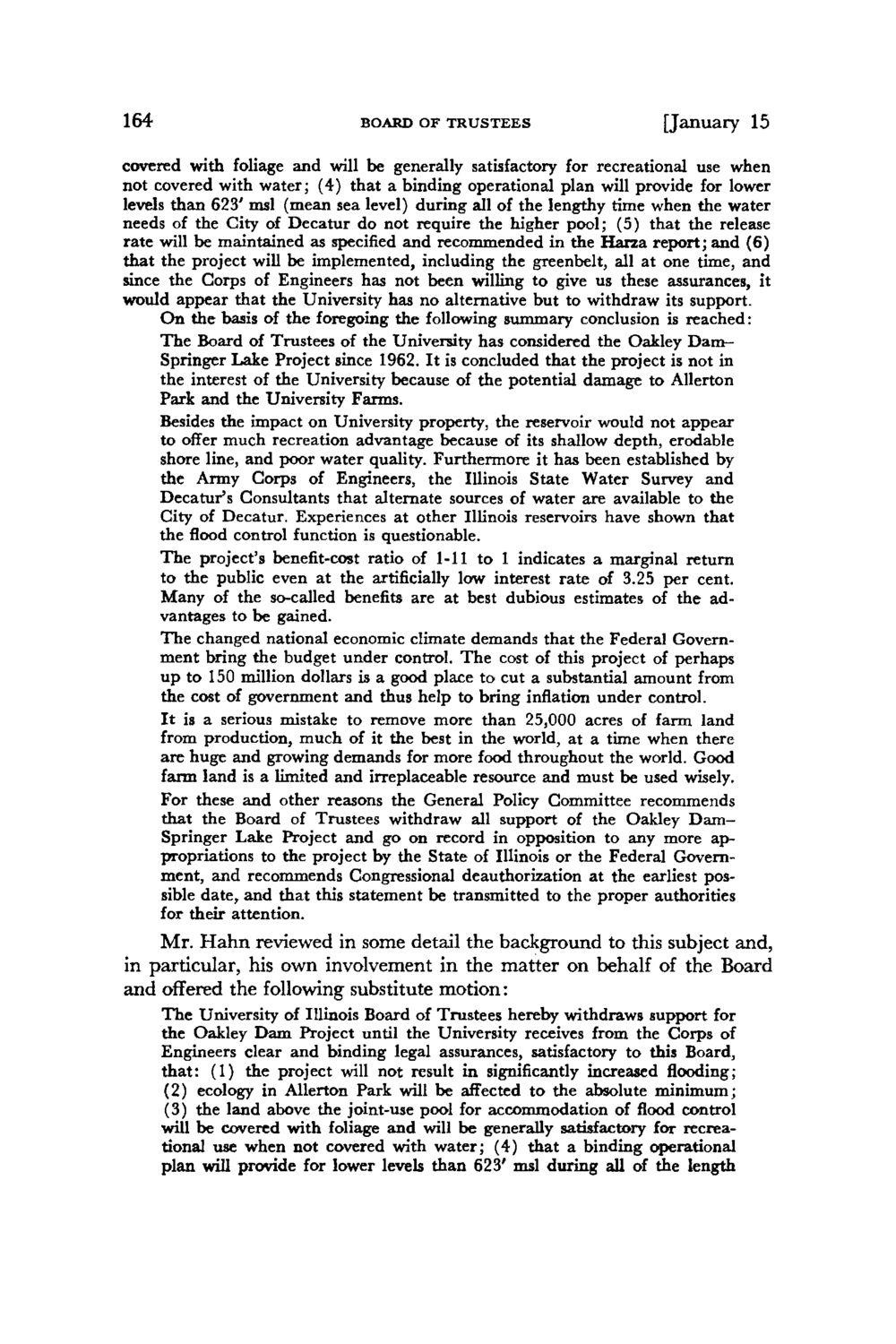| |
| |
Caption: Board of Trustees Minutes - 1976
This is a reduced-resolution page image for fast online browsing.

EXTRACTED TEXT FROM PAGE:
164 BOARD OF TRUSTEES [January 15 covered with foliage and will be generally satisfactory for recreational use when not covered with water; (4) that a binding operational plan will provide for lower levels than 623' msl (mean sea level) during all of the lengthy time when the water needs of the City of Decatur do not require the higher pool; (5) that the release rate will be maintained as specified and recommended in the Harza report; and (6) that the project will be implemented, including the greenbelt, all at one time, and since the Corps of Engineers has not been willing to give us these assurances, it would appear that the University has no alternative but to withdraw its support. On the basis of the foregoing the following summary conclusion is reached: The Board of Trustees of the University has considered the Oakley D a m Springer Lake Project since 1962. It is concluded that the project is not in the interest of the University because of the potential damage to Allerton Park and the University Farms. Besides the impact on University property, the reservoir would not appear to offer much recreation advantage because of its shallow depth, erodable shore line, and poor water quality. Furthermore it has been established by the Army Corps of Engineers, the Illinois State Water Survey and Decatur's Consultants that alternate sources of water are available to the City of Decatur. Experiences at other Illinois reservoirs have shown that the flood control function is questionable. The project's benefit-cost ratio of 1-11 to 1 indicates a marginal return to the public even at the artificially low interest rate of 3.25 per cent. Many of the so-called benefits are at best dubious estimates of the advantages to be gained. The changed national economic climate demands that the Federal Government bring the budget under control. The cost of this project of perhaps up to 150 million dollars is a good place to cut a substantial amount from the cost of government and thus help to bring inflation under control. It is a serious mistake to remove more than 25,000 acres of farm land from production, much of it the best in the world, at a time when there are huge and growing demands for more food throughout the world. Good farm land is a limited and irreplaceable resource and must be used wisely. For these and other reasons the General Policy Committee recommends that the Board of Trustees withdraw all support of the Oakley D a m Springer Lake Project and go on record in opposition to any more appropriations to the project by the State of Illinois or the Federal Government, and recommends Congressional deauthorization at the earliest possible date, and that this statement be transmitted to the proper authorities for their attention. M r . H a h n r e v i e w e d in s o m e detail the background to this subject and, in particular, his o w n i n v o l v e m e n t i n the m a t t e r o n behalf of the Board a n d offered the following substitute m o t i o n : The University of Illinois Board of Trustees hereby withdraws support for the Oakley Dam Project until the University receives from the Corps of Engineers clear and binding legal assurances, satisfactory to this Board, that: (1) the project will not result in significantly increased flooding; (2) ecology in Allerton Park will be affected to the absolute minimum; (3) the land above the joint-use pool for accommodation of flood control will be covered with foliage and will be generally satisfactory for recreational use when not covered with water; (4) that a binding operational plan will provide for lower levels than 623' msl during all of the length
| |